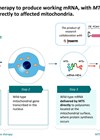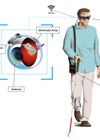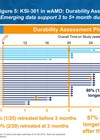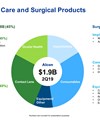Ophthalmology
The Leicester Grading System for Foveal Hypoplasia
The University of Leicester Ulverscroft Eye Unit have published the first medical grading system named after the city of Leicester. Infantile nystagmus is characterised by constant and involuntary eye movements and affects 24 per 10,000 people [1]. Onset is usually...
A focus on Pakistan’s growing eye care needs: over 43 million patients treated for curable blindness free of charge
With 90% of the world’s visually impaired living in developing countries, Pakistan is no exception to this on-going global healthcare challenge. Despite massive leaps over the last few decades in targeting this issue, the World Health Organisation (WHO) reports that...
Renewed momentum in ocular gene and cell therapy, broadening application to chronic disease
Gene and cell therapies offer the prospect of ground-breaking new avenues for the treatment of diseases, reflected in a renewed explosion of interest and investment in retinal gene therapy. Rod McNeil reports recent clinical trial readouts across a diverse range...
Unconscious bias (part 2)
Does unconscious bias exist, and does training help to reduce discriminatory behaviour? Clare Inkster questions her role as a trainer. I read Gwyn Williams’ Learning Curve article on this topic a few months ago with interest, and as someone who...
Setting up successful safe & efficient nurse-led intravitreal injection service
In September 2019, we organised a training course at Great Western NHS Hospital (GWH), Swindon, which provided presentations, discussions and hands-on wet lab experience on how to perform intravitreal injection using intravitreal assisted device (INVITRIA) for nurses and doctors from...
Designing ophthalmology services - Part 1: How do we address the queues in a clinic?
This first of a three-part series shows how systems engineering can be used to correctly diagnose and address the causes of delays in a clinic. The second article, which will be featured in the April/May 2020 issue, describes how to...
Diary from my elective: a Parisian experience
The author explains how a research institute’s dedication to multidisciplinary collaboration helped him to discover a passion for academic ophthalmology. The elective aspect to the final year of a medical degree, through its change of scenery and immersion into another...
Nanosecond laser cataract surgery
The authors review the evidence for nanosecond laser cataract surgery: is this the future? Cataract is a leading cause of visual impairment worldwide, and cataract surgery is one of the most successful and cost-effective healthcare interventions, with a great impact...
Retinal prosthetics: science fiction or a vision for the future?
“Is it a fact – or have I dreamt it – that, by means of electricity, the world of matter has become a great nerve, vibrating thousands of miles in a breathless point of time?” – Nathaniel Hawthorne, The House...
Management of retinal diseases: highlights from the AAO 2019 Retina Subspecialty Day Meeting
The author highlights current debate, opinion and late breaking developments in the management of retinal diseases. The American Academy of Ophthalmology’s 2019 Retina Subspecialty Day Meeting was held on 11-12 October, 2019 in San Francisco, USA. Established and emerging innovative...
Management of DMO and PDR in 2019
An evidence-based approach to the management of diabetic macular oedema (DMO) and proliferative diabetic retinopathy (PDR) in 2019 was outlined by Sobha Sivaprasad, UK, in presentations during the Diabetic Retina scientific session September 6 2019, at the 19th European Society...
Corporate M&A pace gathers momentum
Intensifying franchise competition, maturing product development pipelines and looming loss of exclusivity spur renewed merger and acquisition (M&A) activity in the ophthalmics sector. Rod McNeil reviews recent deals and related strategic developments. AbbVie to acquire Allergan in $63 billion mega-combination,...
















